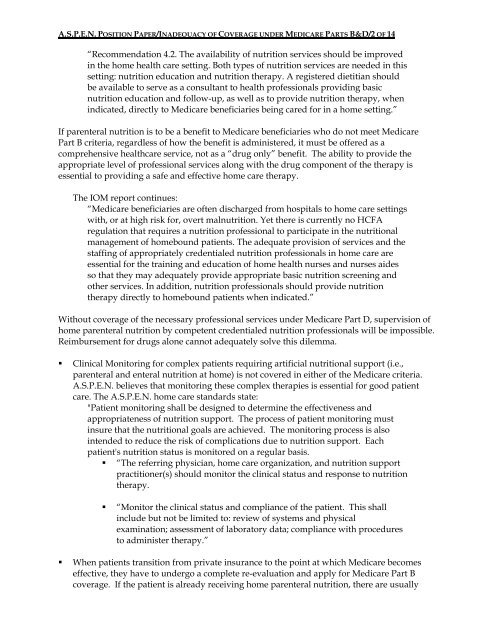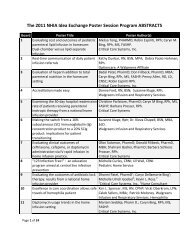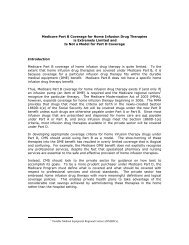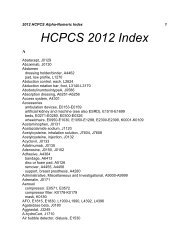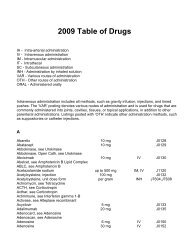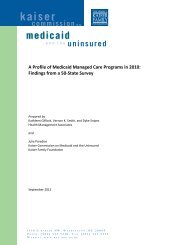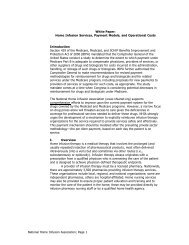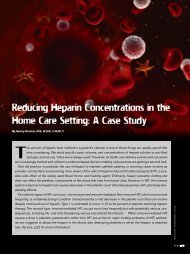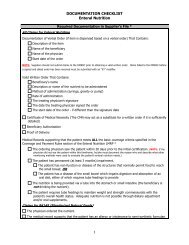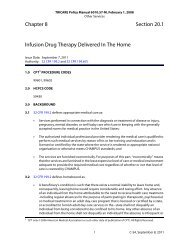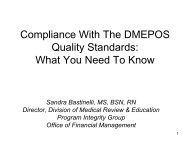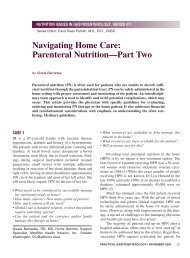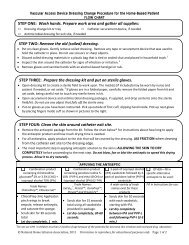Inadequacy of Coverage Under Medicare Part B and - NHIA
Inadequacy of Coverage Under Medicare Part B and - NHIA
Inadequacy of Coverage Under Medicare Part B and - NHIA
Create successful ePaper yourself
Turn your PDF publications into a flip-book with our unique Google optimized e-Paper software.
A.S.P.E.N. POSITION PAPER/INADEQUACY OF COVERAGE UNDER MEDICARE PARTS B&D/2 OF 14<br />
“Recommendation 4.2. The availability <strong>of</strong> nutrition services should be improved<br />
in the home health care setting. Both types <strong>of</strong> nutrition services are needed in this<br />
setting: nutrition education <strong>and</strong> nutrition therapy. A registered dietitian should<br />
be available to serve as a consultant to health pr<strong>of</strong>essionals providing basic<br />
nutrition education <strong>and</strong> follow-up, as well as to provide nutrition therapy, when<br />
indicated, directly to <strong>Medicare</strong> beneficiaries being cared for in a home setting.”<br />
If parenteral nutrition is to be a benefit to <strong>Medicare</strong> beneficiaries who do not meet <strong>Medicare</strong><br />
<strong>Part</strong> B criteria, regardless <strong>of</strong> how the benefit is administered, it must be <strong>of</strong>fered as a<br />
comprehensive healthcare service, not as a “drug only” benefit. The ability to provide the<br />
appropriate level <strong>of</strong> pr<strong>of</strong>essional services along with the drug component <strong>of</strong> the therapy is<br />
essential to providing a safe <strong>and</strong> effective home care therapy.<br />
The IOM report continues:<br />
“<strong>Medicare</strong> beneficiaries are <strong>of</strong>ten discharged from hospitals to home care settings<br />
with, or at high risk for, overt malnutrition. Yet there is currently no HCFA<br />
regulation that requires a nutrition pr<strong>of</strong>essional to participate in the nutritional<br />
management <strong>of</strong> homebound patients. The adequate provision <strong>of</strong> services <strong>and</strong> the<br />
staffing <strong>of</strong> appropriately credentialed nutrition pr<strong>of</strong>essionals in home care are<br />
essential for the training <strong>and</strong> education <strong>of</strong> home health nurses <strong>and</strong> nurses aides<br />
so that they may adequately provide appropriate basic nutrition screening <strong>and</strong><br />
other services. In addition, nutrition pr<strong>of</strong>essionals should provide nutrition<br />
therapy directly to homebound patients when indicated.”<br />
Without coverage <strong>of</strong> the necessary pr<strong>of</strong>essional services under <strong>Medicare</strong> <strong>Part</strong> D, supervision <strong>of</strong><br />
home parenteral nutrition by competent credentialed nutrition pr<strong>of</strong>essionals will be impossible.<br />
Reimbursement for drugs alone cannot adequately solve this dilemma.<br />
• Clinical Monitoring for complex patients requiring artificial nutritional support (i.e.,<br />
parenteral <strong>and</strong> enteral nutrition at home) is not covered in either <strong>of</strong> the <strong>Medicare</strong> criteria.<br />
A.S.P.E.N. believes that monitoring these complex therapies is essential for good patient<br />
care. The A.S.P.E.N. home care st<strong>and</strong>ards state:<br />
"Patient monitoring shall be designed to determine the effectiveness <strong>and</strong><br />
appropriateness <strong>of</strong> nutrition support. The process <strong>of</strong> patient monitoring must<br />
insure that the nutritional goals are achieved. The monitoring process is also<br />
intended to reduce the risk <strong>of</strong> complications due to nutrition support. Each<br />
patient's nutrition status is monitored on a regular basis.<br />
• “The referring physician, home care organization, <strong>and</strong> nutrition support<br />
practitioner(s) should monitor the clinical status <strong>and</strong> response to nutrition<br />
therapy.<br />
• “Monitor the clinical status <strong>and</strong> compliance <strong>of</strong> the patient. This shall<br />
include but not be limited to: review <strong>of</strong> systems <strong>and</strong> physical<br />
examination; assessment <strong>of</strong> laboratory data; compliance with procedures<br />
to administer therapy.”<br />
• When patients transition from private insurance to the point at which <strong>Medicare</strong> becomes<br />
effective, they have to undergo a complete re-evaluation <strong>and</strong> apply for <strong>Medicare</strong> <strong>Part</strong> B<br />
coverage. If the patient is already receiving home parenteral nutrition, there are usually


